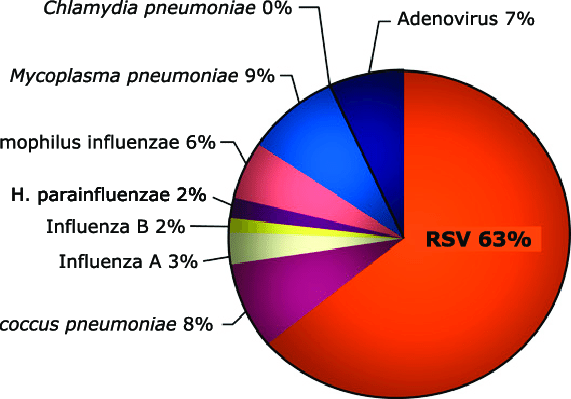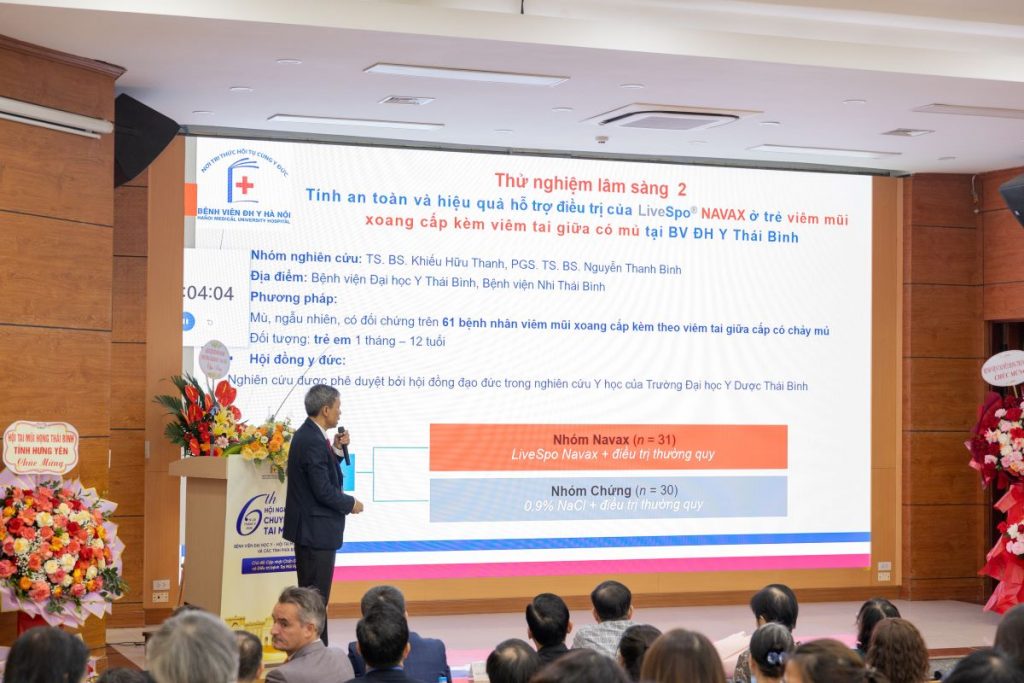So, let’s talk about Acute Respiratory Tract Infections (ARTIs) and how probiotics spray can navigate.
Acute Respiratory Tract Infections (ARTIs), especially ARTIs caused by viruses (Figure 1) are one of the major reasons for diseases and mortality in children and adults worldwide, leading to the development of other diseases [1].
ARTIs are common diseases in people of all ages. In children, the most frequent symptoms include fever, runny nose, and more severe dry rale and moist rale,… In adults, it is found a typically experience symptoms such as continuous sneezing, hoarseness, and loss of voice,… [2,3]. Over 70% of patients with ARTIs are upper ARTIs because this is the primary point of contact between the respiratory system and the external environment including pathogenic agents.
In particular, young children with an immature immune system or elderly individuals with a weakened immune system are more susceptible to ARTIs. Additionally, in other cases, individuals with underlying conditions such as chronic lung disease, smokers or people regularly exposed to a dusty environment are more endangered with ARTIs [4-6].
Figure 1: The respiratory tract infections-causing rate of viruses and bacteria in children (According to WHO statistics)
According to the Centers for Disease Control and Prevention (CDC), US, in 2015, there were up to 17.2 billion cases of ARTIs worldwide. The situation of ARTI diseases is severe due to the growing environmental pollution issue [7,8].
The causes of ARTIs
The major causes of ARTIs include:
- In young children, respiratory syncytial virus (RSV) is a dangerous virus that causes ARTIs in children under 2 years old, accounting for about 60% of the causes of ARTIs in children. It is followed by Andenovirus, influenza virus type A or B, and rhinovirus,… (Figure 1). Fast-forwarding to recent times, humanity has been facing the Covid-19 pandemic caused by the Sars-CoV-2 virus, which has extremely complex strain mutations and is a life-threatening ARTI agent in humans (Figure 2).
Figure 2: Respiratory Tract Infection caused by Coronavirus
(source: https://www.thelancet.com/)
- In addition to viral infections, there are many cases of bacteria surinfections, primarily Streptococcus pneumoniae, Haemophilus influenzae…. The condition of bacteria superinfections can exacerbate respiratory tract infections, making the diseases more severe and increasing the cost of treatment, as antibiotics may be needed (Figure 1).
- Another cause of ARTIs is the changing transitional weather and exposure to environmental pollution with high levels of dust and chemicals.
The role of oral probiotics in the prevention and treatment of ARTIs
In recent years, there have been several research groups that have presented findings demonstrating that probiotics can prevent and help reduce the incidence of respiratory tract infections caused by bacteria and viruses [9]. This is due to their ability to adhere to and inactivate viruses, synthesize inhibitory compounds against virus development, and stimulate the immune system of the host to fend off invading viruses.
The beneficial effects of probiotics, such as increasing the production of peripheral immune globulin, stimulating IgA secretion, and reducing excessive production of pro-inflammatory cytokines (cytokine storm), have been previously reported [10]. The valuable properties of probiotics may be related to modulating immune pathways. The recognized mechanism of action of probiotics in combating viruses is by maintaining the host’s immune responses through the regulation of immune cells and factors (interleukin, Natural Killer Cells, macrophages, immune globulins, T-helper cells).
In animal models, changes caused by antibiotics in the composition of intestinal microflora have been demonstrated to increase the susceptibility to respiratory diseases and respiratory viral infections. Conversely, certain beneficial bacteria such as Lactobacillus and Bifidobacterium have been shown to reduce the incidence of these diseases and improve outcomes of respiratory viral infections [11]. In addition to Lactobacillus and Bifidobacterium, bacteria from other genera such as Lactococus, Bacillus, Streptococcus, Saccharomyces also play similar roles.
- Beneficial bacteria Lactobacillus
Lactobacillus is the name of a genus of bacteria that can take on various shapes, including rod-shaped (bacilli) or spherical, and they may occur singly or in chains. They are Gram-positive bacteria, do not form spores, and can be either facultative anaerobes or aerobes or acidophilic. They thrive in acidic environments and primarily inhabit substrates containing carbohydrates, such as mucous membranes in humans and animals, waste products, and fermenting or decaying foods. Some species within this genus include Lactobacillus reuteri, Lactobacillus acidophilus, Lactobacillus bulgaricus, Lactobacillus casei, Lactobacillus plantarum, Lactobacillus rhamnosus.
A randomized study involving healthy individuals aged 18-60 who consumed products containing Lactobacillus casei 431 showed that the duration of respiratory symptoms was shorter in the probiotic group during the last three weeks of the intervention period compared to the placebo group. However, in a study involving 523 children aged from 2 to 6 who consumed milk containing L. rhamnosus GG daily for 28 weeks, there was no significant reduction in the incidence of various respiratory viruses, including influenza viruses, and respiratory symptoms [4].
Additionally, yogurt containing Lactobacillus delbrueckii ssp. Bulgaricus OLL1073R-1 did not show significant preventive effects against influenza in female healthcare workers. Therefore, the preventive effects against respiratory infections not only depend on the specific probiotic strain used but also on other factors such as manufacturing processes, formulations, administration routes, and the characteristics of the participants. These factors can influence the effectiveness of probiotics in preventing respiratory infections.
- Beneficial bacteria Bifidobacterium
Bifidobacterium is the name of a genus of bacteria that includes bacteria with a rod-shaped (bacilli) and branched appearance. They belong to the Gram-positive group, are anaerobic, and do not form spores. Due to their lack of flagella, they are non-motile, prefer humidity, and grow best at temperatures between 310C and 400C. The supplementation of health-protective foods containing the Bifidobacteria BB12 strain has been studied for its effectiveness in enhancing immune function and supporting seasonal flu prevention [12]. Beneficial bacteria species belonging to the Bifidobacterium difidum, Bifidobacterium breve, Bifidobacterium infantis., Bifidobacterium longum.
Many studies have also shown that Lactobacillus and Bifidobacterium can produce lactic acid and acetic acid, which lower the pH in the intestinal tract and inhibit the growth of other pathogenic microorganisms. They can also boost the immune response by stimulating the activity of lymphocytes and macrophages.
Recent research from the Japanese Pediatrics Society has indicated that daily supplementation with probiotics twice a day can reduce the risk of fever, cough, runny nose, and school absenteeism in children aged 8-13. Additionally, it can prevent the severity of viral infections such as common colds and secondary infections like sinusitis and otitis media. Apart from enhancing immunity against viral infections, probiotics have also been shown to be effective in reducing the incidence of allergic rhinitis and seasonal allergy symptoms in children [13].
Thus, most available evidence demonstrates the anti-inflammatory and immune-regulatory activities of probiotics against respiratory virus infections, partly through the modulation of the gut microbiota. However, clinical trials of oral probiotics have shown somewhat limited effects in treating ARTIs.
The role of nasal-spraying Bacillus spore probiotics in supportive treatment of ARTIs caused by viruses.
Most probiotic products are primarily administered orally, and their effects on respiratory tract infection diseases are often slow to manifest, typically taking 3 to 12 months. Currently, there are research groups worldwide that have reported safety and efficacy results for nasal-spraying probiotic products. Among them, two notable randomized, double-blind, placebo-controlled clinical trials on the safety and effects of the nasal-spraying LiveSpo® Navax, containing 5 billion live spores of two beneficial bacteria strains, Bacillus subtilis ANA4 and B. clausii ANA39 in 5mL water, was conducted on children with RSV and flu at the National Children’s Hospital [12-13].
This marks the world’s first nasal-spraying Bacillus spore probiotic that has been proven to reduce the concentration of influenza virus by 400 times and respiratory syncytial virus (RSV) by about 600 times, delivering an effectiveness that is 26-50 times higher than physiological saline solution. Which, RSV refers to the virus responsible for causing respiratory tract infections in 80% of children under 2 years old for which there is currently no vaccine or specific treatment available.
The research findings have been documented and published in the world’s leading scientific journals such as Scientific Reports-Nature. Additionally, the product had the ability to reduce the sur-infection of bacteria and regulate pro-inflammatory cytokine levels back to normal, helping to reduce cytokine storms and nasal congestion. There were no abnormalities of respiratory distress or nasal mucosa irritation in the children using this product.
This is the world’s first study that has demonstrated the safety and rapid effectiveness of nasal-spraying Bacillus spore probiotics in children with virus-induced ARTIs.
References
- Van Doorn, H. R., & Yu, H. (2020). Viral respiratory infections. In Hunter’s tropical medicine and emerging infectious diseases (pp. 284-288). Elsevier.
- Oyejide, C. O., & Osinusi, K. (1990). Acute respiratory tract infection in children in Idikan community, Ibadan, Nigeria: severity, risk factors, and frequency of occurrence. Reviews of Infectious Diseases, 12(Supplement_8), S1042-SI046.
- He, L., Yang, L., Zhang, H., & Luo, Q. (2020). Efficacy and safety of interferon on neonates with respiratory syncytial virus pneumonia. Experimental and Therapeutic Medicine, 20(6), 1-1.
- Invernizzi, R., Lloyd, C. M., & Molyneaux, P. L. (2020). Respiratory microbiome and epithelial interactions shape immunity in the lungs. Immunology, 160(2), 171-182.
- Wald, E. R., Guerra, N., & Byers, C. (1991). Upper respiratory tract infections in young children: duration of and frequency of complications. Pediatrics, 87(2), 129-133.
- Chung, K. F., & Pavord, I. D. (2008). Prevalence, pathogenesis, and causes of chronic cough. The Lancet, 371(9621), 1364-1374.
- Smith, A., & Matthews, O. (2022). Aromatic ointments for the common cold: what does the science say?. Drugs in Context, 11.
- Jin, X., Ren, J., Li, R., Gao, Y., Zhang, H., Li, J., … & Wang, G. (2021). Global burden of upper respiratory infections in 204 countries and territories, from 1990 to 2019. EClinicalMedicine, 37, 100986.
- Forsythe P. Probiotics and lung immune responses. Ann. Am. Thorac. Soc. 2014;11(Suppl. 1):S33–S37.
- Montazeri-Najafabady N, Ghasemi Y, Dabbaghmanesh MH, Talezadeh P, Koohpeyma F, Gholami A. Supportive role of probiotic strains in protecting rats from ovariectomy-induced cortical bone loss. Probiotics Antimicrob Proteins. 2019;11:1145–1154. doi: 10.1007/s12602-018-9443-6.
- Budden K.F., Gellatly S.L., Wood D.L., Cooper M.A., Morrison M., Hugenholtz P., Hansbro P.M. Emerging pathogenic links between microbiota and the gut–lung axis. Nat. Rev. Microbiol. 2017;15:55–63. doi: 10.1038/nrmicro.2016.142
Jungersen, M., Wind, A., Johansen, E., Christensen, J. E., Stuer-Lauridsen, B., & Eskesen, D. (2014). The Science behind the Probiotic Strain Bifidobacterium animalis subsp. lactis BB-12®. Microorganisms, 2(2), 92-110. https://covid19.gov.vn/
- Tran DM, Tran TT, Phung TTB, Bui HT, Nguyen PTT, Vu TT, et al. Nasal-spraying Bacillus spores as an effective symptomatic treatment for children with acute respiratory syncytial virus infection. Sci Rep. 2022;12(1): 12402. doi: 10.1038/s41598-022-16136-z.
- Tu TT. et al., Efficient symptomatic treatment and viral load reduction for children with influenza virus infection by nasal-spraying Bacillus spore probiotics. Sci Rep. 2023; 13:14789.







